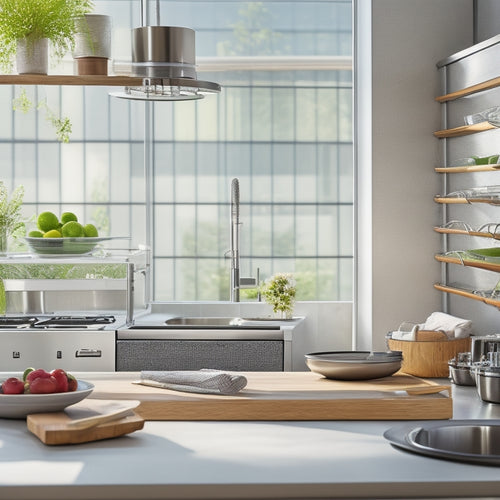
Unravel Stove Woes With Expert Repair Tips
Share
Stove malfunctions can disrupt kitchen operations, leading to unevenly cooked meals, safety hazards, and unnecessary stress. Common issues include uneven heating, burner problems, and oven temperature discrepancies. To avoid these woes, it's necessary to address underlying problems promptly and accurately. Professional repair is vital, as intricate components and safety hazards require expert diagnosis and handling. By understanding the importance of accurate oven temperatures, gas stove safety essentials, and identifying repair needs, you can prevent further damage and ensure your stove operates efficiently. Next, discover the key signs that indicate it's time to call a professional for timely repair and kitchen peace.
Key Takeaways
• Malfunctioning stove elements and burners can cause uneven heating and ignition issues, requiring expert diagnosis and repair for optimal performance.
• Professional repair is crucial for gas stoves, as DIY troubleshooting can exacerbate safety risks and mask underlying issues, leading to further damage.
• Accurate oven temperatures are essential for consistent cooking results, and a malfunctioning thermostat can compromise culinary success, making expert repair vital.
• Regular maintenance and prompt attention to unusual stove behavior can prevent risks and ensure optimal performance, making expert repair a worthwhile investment.
• Expert repair can identify and rectify gas-related concerns, providing peace of mind and ensuring a safe cooking environment, which is critical for household safety.
Common Stove Issues Explained
When it comes to stove operation, a multitude of issues can arise, compromising cooking performance and potentially posing safety risks. These issues include uneven heating, burner problems, oven heat discrepancies, gas odor, and difficulty in maintaining accurate oven temperatures.
Uneven heating can be caused by malfunctioning heating elements, burners, or control switches, leading to inconsistent cooking results. Burner problems, such as failure to ignite or weak flames, can be attributed to clogged burner ports or ignition systems. These issues not only affect cooking performance but also pose safety risks, making it essential to address them promptly.
Why Professional Repair Matters
Because stove repair involves intricate components and potential safety hazards, it is important to entrust the task to experienced professionals who can accurately diagnose and resolve issues. Professionals possess the necessary expertise to navigate complex stove problems, making sure that safety considerations are addressed and potential risks are mitigated.
The benefits of professional repair are multifaceted, including precise diagnosis, superior stove operation, and extended appliance life. Additionally, professionals can identify and rectify gas-related concerns, a vital aspect of stove repair.
Gas Stove Safety Essentials
Gas stove safety hinges on prompt attention to potential hazards, including gas leaks, faulty ignition systems, and improper installation, which can be devastating if left unchecked.
Regular gas stove maintenance is essential to prevent such risks. Make sure that your stove is installed and serviced by a licensed professional to avoid any potential hazards.
In case of a gas leak, turn off the gas supply immediately and ventilate the area. Do not attempt to repair or troubleshoot gas-related issues yourself, as it can lead to serious consequences. Instead, follow emergency procedures and contact a professional repair service.
Accurate Oven Temperatures Matter
Maintaining accurate oven temperatures is important for achieving consistent cooking results, as even slight deviations can greatly impact the quality of baked goods and cooked meals.
Temperature precision is essential for baking perfection, as it guarantees that delicate pastries and cakes are cooked to the desired texture and flavor. Culinary success relies heavily on heat consistency, which can be compromised by a malfunctioning thermostat or heating element.
Inaccurate oven temperatures can lead to undercooked or overcooked dishes, ruining the overall culinary experience. To ensure ideal cooking results, it is crucial to address any oven heat discrepancies promptly, guaranteeing that your stove is functioning at its peak.
Identifying Stove Repair Needs
When your stove exhibits unusual behavior, such as inconsistent heating, unusual smells, or burner malfunctions, it is important to identify the root cause of the issue to determine whether professional repair services are needed.
Conducting DIY troubleshooting can help pinpoint the problem, but it's vital to take safety precautions to avoid exacerbating the issue or compromising your safety. Be cautious of gas odors, as they may indicate a serious safety hazard.
If you're unsure about the diagnosis or feel uncomfortable with the repair, it's best to err on the side of caution and seek professional assistance. By identifying the repair needs accurately, you can guarantee a safe and effective solution, preventing further damage and potential risks.
When to Call a Pro
Your stove's malfunctioning burner or thermostat can escalate into a serious safety hazard or additional damage if not addressed promptly, making it important to recognize the scenarios that necessitate professional intervention.
While DIY troubleshooting can resolve minor issues, complex problems and safety considerations require expert attention.
Gas-related concerns, such as gas odors or leaks, demand immediate professional intervention to prevent potential disasters.
If you're unsure about the diagnosis or repair, it's best to call a pro to avoid introducing complications that can increase repair costs later on.
Prioritizing safety and seeking timely professional help can prevent additional damage, secure your stove's longevity, and maintain a safe kitchen environment.
Timely Repair for Kitchen Peace
Swiftly addressing stove issues is vital for kitchen smoothness, as timely repairs not only guarantee a safe cooking environment but also prevent additional damage, reduce repair costs, and extend the appliance's lifespan.
By prioritizing timely maintenance, homeowners can avoid the consequences of neglecting stove problems, such as safety hazards, inefficient cooking, and costly repairs.
When stove issues arise, DIY troubleshooting can be a viable starting point for minor problems. However, for more complex or gas-related concerns, it is important to seek professional assistance to ensure safety and effective resolution.
Frequently Asked Questions
Can a Faulty Stove Be Repaired or Should It Be Replaced?
When deciding between repairing or replacing a faulty stove, consider the cost comparison, extended warranty, and safety implications. If the repair cost is less than 50% of the replacement value, it's often worth repairing, especially if still under warranty, to guarantee safety and extend the appliance's lifespan.
How Often Should I Clean My Stove to Prevent Maintenance Issues?
To prevent maintenance issues, establish a regular cleaning frequency, ideally every 1-2 weeks, and incorporate a maintenance schedule to identify potential problems early, ensuring swift troubleshooting and minimizing the risk of safety hazards.
Are DIY Stove Repair Kits a Cost-Effective Solution?
While DIY stove repair kits may seem cost-effective, they often mask underlying issues, leading to hidden costs and compromised safety. Professional repairs guarantee accurate diagnoses, efficient solutions, and long-term savings, making them a more prudent investment.
What Causes a Stove's Heating Element to Malfunction Suddenly?
A stove's heating element can malfunction suddenly due to wear and tear, poor maintenance, or clogged burner ports, causing uneven heating, sparking, or complete failure, necessitating prompt troubleshooting and expert repair to prevent safety hazards.
Can a Professional Repair Service Also Provide Stove Maintenance Tips?
A professional repair service can provide stove maintenance tips, including preventive measures and troubleshooting advice, to guarantee stove performance, prevent breakdowns, and promote safe stove care through regular cleaning and inspections.
Related Posts
-

Top-Rated Dish Drainers for Kitchen Use
Top-rated dish drainers enhance your kitchen's efficiency and aesthetics. You'll find compact designs that save preci...
-

Space-Efficient Dish Racks for Tiny Homes
Space-efficient dish racks are a game changer for tiny homes. By utilizing vertical storage, you can free up signific...
-

Countertop Storage Ideas for Busy Homeowners
As a busy homeowner, optimizing your kitchen countertop is essential for efficiency and style. Consider using vertica...


